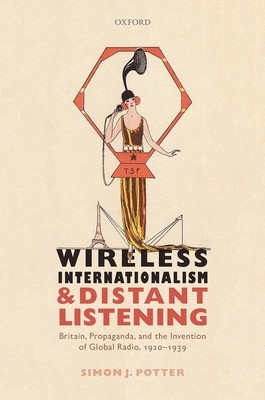
- We will send in 10–14 business days.
- Author: Simon J Potter
- Publisher: Oxford University Press, USA
- ISBN-10: 0198800231
- ISBN-13: 9780198800231
- Format: 16.3 x 23.6 x 2.3 cm, hardcover
- Language: English
- SAVE -10% with code: EXTRA
Reviews
Description
During the 1920s and 1930s the new medium of radio broadcasting promised to transform society by fostering national unity and strengthening and popularising national cultures. However, many hoped that 'wireless' would also encourage international understanding and world peace. Intentionally or otherwise, wireless signals crossed borders, bringing talk, music, and news to enthusiastic 'distant listeners' in other countries. In Europe, radio was regulated through international consultation and cooperation, to restrict interference between stations, and to unleash the medium's full potential to carry programmes to global audiences. A distinctive form of 'wireless internationalism' emerged, reflecting and reinforcing the broader internationalist movement and establishing structures and approaches which endured into the Second World War, the Cold War, and beyond. This study reveals this untold history.
Wireless Internationalism and Distant Listening also explores the neglected interwar experience of distant listening, revealing the prevalence of listening across borders and explaining how individuals struggled to overcome unwanted noise, tune in as many stations as possible, and comprehend and enjoy what they heard. The volume shows how radio brought the world to Britain, and Britain to the world. It revises our understanding of early BBC broadcasting and the BBC Empire Service (the precursor to today's World Service) and shows how government influence shaped early BBC international broadcasting in English, Arabic, Spanish, and Portuguese. It also explores the wider European and trans-Atlantic context, demonstrating how Fascism in Italy and Germany, the Spanish Civil War, and the Japanese invasion of China, combined to overturn the utopianism of the 1920s and usher in a new era of wireless nationalism.EXTRA 10 % discount with code: EXTRA
The promotion ends in 19d.01:26:54
The discount code is valid when purchasing from 10 €. Discounts do not stack.
- Author: Simon J Potter
- Publisher: Oxford University Press, USA
- ISBN-10: 0198800231
- ISBN-13: 9780198800231
- Format: 16.3 x 23.6 x 2.3 cm, hardcover
- Language: English English
During the 1920s and 1930s the new medium of radio broadcasting promised to transform society by fostering national unity and strengthening and popularising national cultures. However, many hoped that 'wireless' would also encourage international understanding and world peace. Intentionally or otherwise, wireless signals crossed borders, bringing talk, music, and news to enthusiastic 'distant listeners' in other countries. In Europe, radio was regulated through international consultation and cooperation, to restrict interference between stations, and to unleash the medium's full potential to carry programmes to global audiences. A distinctive form of 'wireless internationalism' emerged, reflecting and reinforcing the broader internationalist movement and establishing structures and approaches which endured into the Second World War, the Cold War, and beyond. This study reveals this untold history.
Wireless Internationalism and Distant Listening also explores the neglected interwar experience of distant listening, revealing the prevalence of listening across borders and explaining how individuals struggled to overcome unwanted noise, tune in as many stations as possible, and comprehend and enjoy what they heard. The volume shows how radio brought the world to Britain, and Britain to the world. It revises our understanding of early BBC broadcasting and the BBC Empire Service (the precursor to today's World Service) and shows how government influence shaped early BBC international broadcasting in English, Arabic, Spanish, and Portuguese. It also explores the wider European and trans-Atlantic context, demonstrating how Fascism in Italy and Germany, the Spanish Civil War, and the Japanese invasion of China, combined to overturn the utopianism of the 1920s and usher in a new era of wireless nationalism.

Reviews